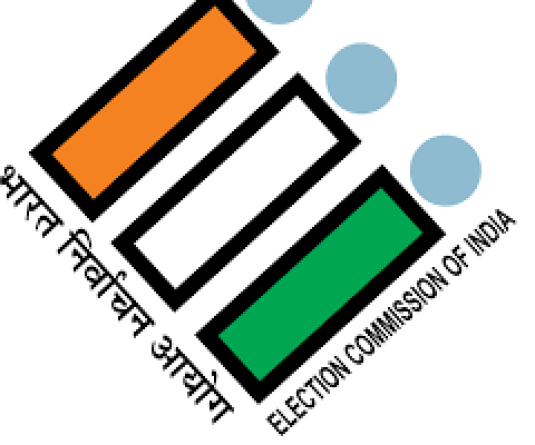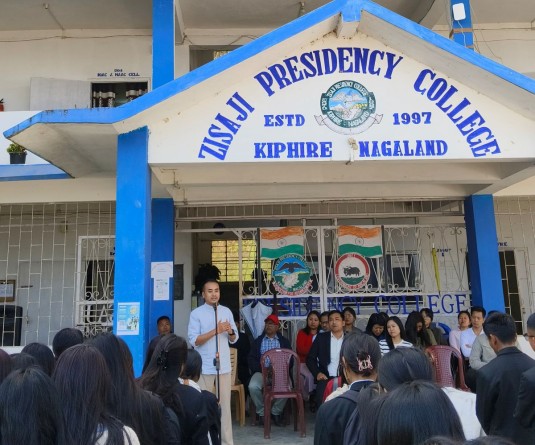Department of Political Science, St Joseph University, Chümoukedima marked the International Day of the World’s Indigenous Peoples 2024 by launching the annual “Colloquy on Peace” initiative.

Chümoukedima, August 9 (MExN): The Department of Political Science, St Joseph University, Chümoukedima marked the International Day of the World’s Indigenous Peoples 2024 by launching the annual “Colloquy on Peace” initiative.
The event aimed to explore pathways to lasting peace and promote self-determination for the indigenous Naga people. Dr Shonreiphy Longvah, Associate Professor, was the coordinator of the event.
The guest speaker, Gam A Shimray, Secretary General of the Asia Indigenous Peoples Pact (AIPP), delivered a keynote address on the importance of this year’s theme, “Protecting the Rights of Indigenous Peoples in Voluntary Isolation and Initial Contact.” He shared insights into the challenges faced by various indigenous groups worldwide, including the Onge, Jarawa, and Sentinelese in India’s Andaman and Nicobar Islands, whose isolated ways of life are currently under significant threat from logging activities.
The United Nations supports the isolation of indigenous peoples to safeguard their distinct culture and way of life, recognizing decolonization and self-determination as crucial in ending violence against them. However, the Indian Government’s efforts to assimilate indigenous peoples into mainstream society, as seen in their championing of ILO Convention 107, have been met with resistance.
Indigenous peoples rejected this convention, as it perpetuates the notion that they are a “temporary society” that must be integrated into the dominant culture, disregarding their right to maintain their unique identities and autonomy. The 2007 UN Declaration on the Rights of Indigenous Peoples marked a significant shift, establishing a fundamental framework for indigenous rights and acknowledging their status as a non-state society.
According to Shimray, the UN’s delay in recognizing indigenous peoples’ unique status stemmed from its own foundation in the state system, which struggled to accommodate the distinct nature of indigenous societies. This declaration represented a crucial step forward, setting minimum standards for indigenous rights and recognizing their autonomy beyond the traditional state framework.
The search for an accurate term to describe indigenous groups led to an evolution in terminology, from “population” to “people” and finally to “peoples.” This shift acknowledges that indigenous groups are not a homogeneous entity, but rather a diverse collection of distinct societies. The term “peoples” recognizes and respects the unique cultural, linguistic, traditional, and identity-based differences between indigenous groups, affirming their right to self-determination and collective rights. This nuanced terminology honours the complexity and individuality of indigenous identities worldwide.
Shimray contextualised the theme by noting that the Naga people were among the first to celebrate Indigenous Peoples’ Day in 1993, but have since lost touch with their indigenous roots. Now, their identity is primarily defined in confrontation to the Indian government and neighbouring communities, leading to a reactive and confrontational approach. This has fostered tribalism and divisions within the Naga community, which is geographically part of Southeast Asia but geopolitically tied to South Asia. As a result, the Naga issue is not about polarization, but rather about fragmentation and disintegration, highlighting the need for a more proactive and inclusive approach to reclaiming their indigenous values and identity.
The Naga identity should be rooted in fundamental indigenous principles, such as communal sharing and traditional land stewardship, which surpass the state’s system. To safeguard these ways of life, reforms are necessary at both the UN and national levels, prioritizing the rediscovery and revitalization of indigenous values.
In India, indigenous values must be integrated into the state system, which still perpetuates the colonial-era bureaucratic framework designed to exploit resources and exert control, rather than promote participation and democracy. This requires a transformative shift to embrace indigenous perspectives and ensure their meaningful inclusion in governance.
The programme was enriched by indigenous performances, including a rendition of “One Day” by PG III students and a captivating play, “A Sumi Folktale on Hornbill,” presented by UG V students.





